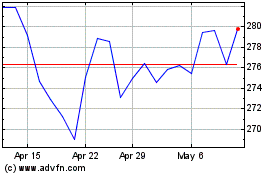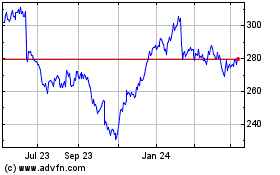Coronavirus Pandemic Slashes Donations of Lifesaving Plasma
August 19 2020 - 4:46AM
Dow Jones News
By Mike Cherney
SYDNEY--Collections of blood plasma have fallen sharply in
recent months because of the coronavirus pandemic, raising worries
about the supply of important medicines that rely on it.
CSL Ltd., which runs one of the biggest collection-center
networks in the U.S., said plasma donations fell by more than 25%
in the three months through June. Grifols SA, which is based in
Spain but has facilities in the U.S., has said it expects plasma
availability this year to drop by 10% compared with a year ago.
The decline is worrying for patients with illnesses ranging from
immune disorders to cancer for whom plasma-derived therapies can be
lifesaving. Many need immunoglobulin, which contains antibodies
harvested from plasma, and is manufactured by pharmaceutical
companies that supply hospitals and clinics.
"Across the globe, there's going to be a lot of tightness in the
market and there will be some shortages in various countries," CSL
Chief Executive Paul Perreault said of immunoglobulin. "Whether the
U.S. sees all of that or not, really depends on how quickly plasma
collections come back."
Immunoglobulin's role in health care has gained a bigger profile
during the pandemic. Researchers are studying whether blood-plasma
transfusions from recovered Covid-19 patients are safe and improve
outcomes for severely ill patients. Data are so far promising,
adding urgency to discussions about building a plasma stockpile
from recovered Covid-19 patients in the U.S.
However, the pandemic has also disrupted companies' ability to
secure enough plasma, despite U.S. authorities relaxing certain
rules to help process donations faster.
While CSL's collection centers in the U.S. have been allowed to
remain open throughout the pandemic, Mr. Perreault said the
patchwork of different lockdown measures across the country made it
confusing for would-be donors to know if their local center was
accepting donations. In some cases, local authorities placed limits
on how many people could be in the centers, creating long wait
times and dissuading some donors, he said.
It takes months for raw plasma to be made into the
immunoglobulin that is given to patients, so any shortage likely
wouldn't appear until next year.
If the coronavirus crisis eases, it could be easier for people
to donate plasma, and donors might be more comfortable going to a
collection center. However, donors in the U.S. get paid, and
another round of stimulus could dissuade people from donating if
they don't need cash.
"The situation is still uncertain and difficult to predict in
the long run," Grifols said in July.
Companies that run collection centers have already made changes
to make donors more comfortable during the pandemic, including
putting up barriers between beds, increasing the distance between
the beds and checking temperatures of all donors who came through
the door.
Mr. Perreault said CSL has a modest inventory of finished plasma
products, while noting that collections have improved in recent
weeks compared with the peak period of lockdowns. Goldman Sachs
estimated that CSL's plasma collections would need to decline by
30% this year for the company's supply of plasma therapies to be
affected materially.
There have been plasma shortages in the past, even without a
pandemic. Last year, some U.S. hospitals had to suspend
immunoglobulin treatments for many patients because of supply
issues. At the time, some immunoglobulin manufacturers said there
was increased demand for the product because of higher rates of
diagnosis of conditions that it has long treated, plus new uses for
the drug.
Periodic plasma shortages have led pharmaceutical companies to
invest more in collection centers in recent years to increase
supply of the raw material. Morgan Stanley estimated that U.S.
plasma collection increased by 10% in 2019. CSL, which has its
headquarters in Australia, opened 40 new collection centers in the
U.S. in the 2020 fiscal year that ended in June. It plans to open
another 20 to 30 in the current fiscal year.
"CSL is in the business to take care of patients," Mr. Perreault
said on Wednesday, shortly after CSL reported a 10% rise in profit
for fiscal 2020. "We're going to do everything in our power to make
sure that they're supplied."
Write to Mike Cherney at mike.cherney@wsj.com
(END) Dow Jones Newswires
August 19, 2020 05:31 ET (09:31 GMT)
Copyright (c) 2020 Dow Jones & Company, Inc.
CSL (ASX:CSL)
Historical Stock Chart
From Dec 2024 to Jan 2025

CSL (ASX:CSL)
Historical Stock Chart
From Jan 2024 to Jan 2025
